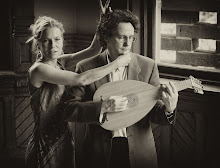We talked about how, for the Renaissance, the lute took the place of the Ancient lyre, using these pictures. Compare how the listeners to Orpheus the lyre player and Francesco da Milano (who died in 1547) are in nearly the same poses. (This is from an article by Roger Harmon in the Lute Society Journal in 1996.)

So what aristocrat, or socially climbing wannabe aristocrat merchant, wouldn’t want to get lute lessons to make his daughter more marriageable? All of the great and the good were imitating the Ancient Greeks and Romans - that’s what the Renaissance were re-birthing after all. The suitors in Shrew pose as Latin teacher and lute teacher to get close to the ladies, but they’re both peddling the same thing – a classical humanist education.
We sang Coy Daphne and Chaste Daphne from John Danyel’s songbook, which is dedicated to his student Miss Anne Greene. This has the tale of Daphne being chased Phoebus Apollo from Ovid (so she gets her classical myth lesson with her music lesson). In one set of words the listener is left wondering why she would not just acquiesce to his pursuit, but in the second, no doubt preferred by Anne’s dad, who was paying for the lessons and the dedication, she is praised for preferring to be turned into a tree rather than be ravished by the god. We then sang Like as the lute, the text by John’s brother Samuel, which is set like a needlepoint sampler of musical terms as Sam’s poem compares musical effects to his love. Then we sang Eyes look no more which seems like it may have been made to order when Anne or dad Sir William said ‘that Dowland song Flow my tears is very popular. Can you do us one like that?’
We then went on with some manuscript collections from a bit later, collected by Anne Twice and Elizabeth Davenant. These have lots of play songs which you might imagine a young woman being excited to sing, having just heard them in the theatre. Elizabeth’s songbook particularly has lots of written out ornaments as you might hear a pop diva now embellishing the Star Spangled Banner. Maybe Elizabeth’s book has a didactic bent too, to teach her how to ornament.
We finished with songs from the youth of the Egerton sisters, daughters of the Earl of Bridgewater, a major aristocrat, composed by their teacher Henry Lawes. We sang the saucy Sweet stay a while (do you really want your teenage daughter thinking about what the protagonists of that have been up too?) and then a song ‘To a Lady singing the Former Song’. Here Lawes pats himself on the back mostly, while praising his student. He throws in more comparisons of himself to myths from Ovid, so the girls get another Latin literature lesson. But it also makes you think about how at the same time, the music teacher is master and servant in a society that is very concerned with hierarchy. He's the 'maestro' but is still thanking you for his pay at the end of the day.
We finished off with Lawes’s setting of the table of contents from an Italian songbook (complete gibberish of course, set in the dramatic Italianate style) no doubt to make fun of those less educated who didn’t have a clue what they sang, but wanted repertoire in the fashionable Italian style.




1 comment:
Sounds super! thanks for posting
Post a Comment